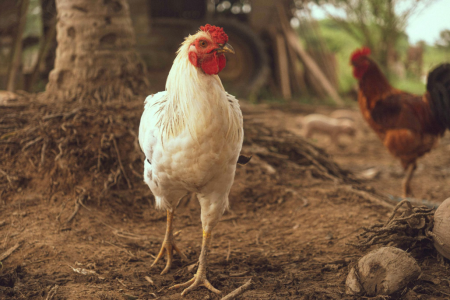Critical warning: First US human death from bird flu reported
By
Aubrey Razon
- Replies 0
The first US human death from bird flu has sparked nationwide concern. This shocking development raises urgent questions about what it means for us all.
Are you prepared to protect yourself and your loved ones?
The individual who passed away was a senior over the age of 65 with pre-existing health conditions, hospitalized in Louisiana.
This case, linked to exposure to a combination of backyard poultry and wild birds, marks a significant moment in the ongoing battle against the H5N1 strain of bird flu.
The GrayVine community, with many of us in the over-60 demographic, may be particularly interested in the implications of this news.
It's crucial to stay informed and vigilant, especially when it comes to health risks that may affect us more severely due to age or underlying conditions.

The H5N1 virus is a type of influenza that primarily affects birds but has the potential to infect humans.
While human cases have been rare, they can be severe and sometimes fatal.
The Centers for Disease Control and Prevention (CDC) has been monitoring the situation closely, with most human infections resulting from direct contact with infected animals.
The majority of the cases in the US have been mild, presenting symptoms such as pinkeye, coughs, or sneezes.
However, the Louisiana patient's death is a stark reminder of the virus's potential severity.
The CDC has reassured the public that the immediate risk to public health remains low, with no evidence of person-to-person transmission, which would significantly escalate the threat level.
However, the virus's presence in the Louisiana patient showed mutations that could potentially increase transmissibility to humans.
Since the H5N1 strain began spreading globally among wild birds and poultry in 2020, the US has seen over 130 million birds infected or culled.
The virus has also affected dairy cows and other mammals, with more than 900 cases detected in cattle since March 2022.
The increased transmission among animals raises the possibility of human exposure and the chance of the virus mutating in ways that could lead to a pandemic.
Notably, bird flu seems to spread effectively on dairy farms, possibly due to cows shedding the virus through their mammary glands and infecting others through raw milk.
For those concerned about the risk of bird flu, the CDC advises against consuming unpasteurized raw milk and recommends avoiding contact with sick or dead animals.
Farmworkers in affected areas should wear personal protective equipment and monitor for symptoms.
The federal response includes testing the national milk supply and allocating funds for surveillance, laboratory testing, and medical research.
However, some experts argue that the response has been too slow or limited, potentially increasing the risk of a more dangerous spread.
What you can do to stay safe
1. Stay Informed: Keep up-to-date with the latest news and guidelines from health authorities.
2. Practice Good Hygiene: Wash your hands frequently, especially if you come into contact with birds or visit farms.
3. Avoid Raw Milk: Stick to pasteurized dairy products to reduce the risk of infection.
4. Be Cautious with Wildlife: Avoid contact with wild birds and report any sick or dead birds to local authorities.
5. Seek Medical Attention: If you experience flu-like symptoms and have been exposed to potentially infected animals, contact your healthcare provider immediately.
Remember, while the risk to individuals remains low, taking proactive steps can make a significant difference in safeguarding your health.
Let's continue to navigate this outbreak with caution and care, ensuring that we can all enjoy our golden years to the fullest.
 Have you taken any steps to protect yourself from bird flu? Do you have a plan in place if bird flu cases increase in your community? Share your thoughts in the comments below.
Have you taken any steps to protect yourself from bird flu? Do you have a plan in place if bird flu cases increase in your community? Share your thoughts in the comments below.
Are you prepared to protect yourself and your loved ones?
The individual who passed away was a senior over the age of 65 with pre-existing health conditions, hospitalized in Louisiana.
This case, linked to exposure to a combination of backyard poultry and wild birds, marks a significant moment in the ongoing battle against the H5N1 strain of bird flu.
The GrayVine community, with many of us in the over-60 demographic, may be particularly interested in the implications of this news.
It's crucial to stay informed and vigilant, especially when it comes to health risks that may affect us more severely due to age or underlying conditions.

The United States has recorded its first human death due to the H5N1 bird flu virus. Image source: Jhostin Peraza/Pexels.
The H5N1 virus is a type of influenza that primarily affects birds but has the potential to infect humans.
While human cases have been rare, they can be severe and sometimes fatal.
The Centers for Disease Control and Prevention (CDC) has been monitoring the situation closely, with most human infections resulting from direct contact with infected animals.
The majority of the cases in the US have been mild, presenting symptoms such as pinkeye, coughs, or sneezes.
However, the Louisiana patient's death is a stark reminder of the virus's potential severity.
The CDC has reassured the public that the immediate risk to public health remains low, with no evidence of person-to-person transmission, which would significantly escalate the threat level.
However, the virus's presence in the Louisiana patient showed mutations that could potentially increase transmissibility to humans.
Since the H5N1 strain began spreading globally among wild birds and poultry in 2020, the US has seen over 130 million birds infected or culled.
The virus has also affected dairy cows and other mammals, with more than 900 cases detected in cattle since March 2022.
The increased transmission among animals raises the possibility of human exposure and the chance of the virus mutating in ways that could lead to a pandemic.
Notably, bird flu seems to spread effectively on dairy farms, possibly due to cows shedding the virus through their mammary glands and infecting others through raw milk.
For those concerned about the risk of bird flu, the CDC advises against consuming unpasteurized raw milk and recommends avoiding contact with sick or dead animals.
Farmworkers in affected areas should wear personal protective equipment and monitor for symptoms.
The federal response includes testing the national milk supply and allocating funds for surveillance, laboratory testing, and medical research.
However, some experts argue that the response has been too slow or limited, potentially increasing the risk of a more dangerous spread.
What you can do to stay safe
1. Stay Informed: Keep up-to-date with the latest news and guidelines from health authorities.
2. Practice Good Hygiene: Wash your hands frequently, especially if you come into contact with birds or visit farms.
3. Avoid Raw Milk: Stick to pasteurized dairy products to reduce the risk of infection.
4. Be Cautious with Wildlife: Avoid contact with wild birds and report any sick or dead birds to local authorities.
5. Seek Medical Attention: If you experience flu-like symptoms and have been exposed to potentially infected animals, contact your healthcare provider immediately.
Remember, while the risk to individuals remains low, taking proactive steps can make a significant difference in safeguarding your health.
Let's continue to navigate this outbreak with caution and care, ensuring that we can all enjoy our golden years to the fullest.
Key Takeaways
- The United States has recorded its first human death due to the H5N1 bird flu virus.
- The patient was over 65 with underlying medical conditions and had been exposed to a mix of backyard and wild birds.
- While there is no evidence of the virus spreading from person to person, a sample from the Louisiana patient showed mutations that might increase transmissibility to humans.
- The CDC advises the public to avoid drinking unpasteurized raw milk and to take precautions when in contact with birds, and the U.S. has stepped up its response to the bird flu outbreak with additional funding and testing.






